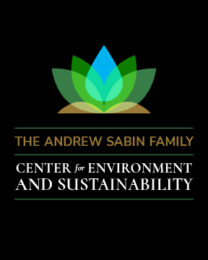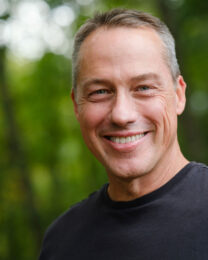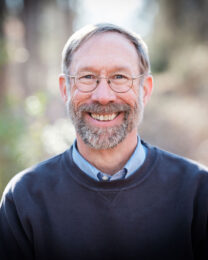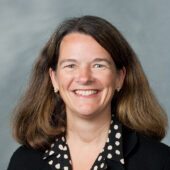$5M gift from the Andrew Sabin Family Foundation advances environment and sustainability efforts
With a leadership gift from the Andrew Sabin Family Foundation, Wake Forest University will substantially expand its work to answer the world’s most pressing environmental and sustainability questions.
Wake Forest’s Center for the Environment, Energy and Sustainability (CEES) will become the Andrew Sabin Family Center for Environment and Sustainability. The $5 million gift will support research, education and outreach through collaboration within the University and with partners around the globe.
will become the Andrew Sabin Family Center for Environment and Sustainability. The $5 million gift will support research, education and outreach through collaboration within the University and with partners around the globe.
The Sabin Center will serve as a leader and model of interdisciplinary scholarship and creative work focused on critical issues including climate change, biodiversity loss, environmental contamination, drought and water scarcity, resource depletion and deforestation.
“World-changing impact starts with a world-changing vision.” Wake Forest President Susan R. Wente
“Because of this generous gift, Sabin Center faculty, students and staff will engage in research to solve some of the greatest challenges of our day – and serve as catalysts for good in society,” Wente said.
The Andrew Sabin Family Foundation’s investment will create new opportunities for faculty and students to develop innovative ideas and take methods, technology and results from scholarly and academic spaces into the public realm to enact profound change.
“It is a privilege to support Wake Forest’s newest initiative. The world needs so many more smart young people with the hearts, minds and skills to tackle the issues facing Earth’s life-supporting systems. Nothing can be more important and the need is urgent,” said Andy Sabin. “My mission on Earth is to enhance the planet and society. Wake’s style of research and teaching – in classrooms, labs and out in the world’s wildest places – is exactly the diversified approach that can fulfill that mission.”
For more than a decade, through CEES, Wake Forest has brought together teams of scholars and students with interests ranging from the natural sciences and social sciences to the arts and humanities to address environmental challenges.

Miles Silman
“We’re focused on the future of the planet and this gift will transform our work,” said Miles Silman, the Andrew Sabin Family Foundation Professor of Conservation Biology at Wake Forest and the founding director of CEES. “By really applying the power of a university, of thinking about what makes a society function and what moves the society ahead, we can address these pressing environmental and sustainability problems, both locally and in the most remote, difficult places on Earth.”
Silman is a renowned ecologist who has researched biodiversity and ecology in the Western Amazon and Andes for more than three decades. His collaborative work to understand and protect Earth’s remaining wildlands, along with the efforts of a broad group of faculty addressing renewable energy and developing new business and legal approaches to sustainability, shaped the trajectory of CEES.
“One of the things that amazes me about Wake Forest is how many superstars we have spread across the University who are working on environmental and sustainability issues. The Sabin Center allows us to come together to address problems that have real impact in the world.”
Silman will direct research initiatives for the Sabin Center and will co-lead the Sabin Center with Stan Meiburg, who is a former deputy administrator of the Environmental Protection Agency with a distinguished 39-year career at the agency and deep policy expertise.
An ongoing commitment to a better world
With a commitment to promote critical thinking and effective action across the fields of renewable energy, social influence, environmental policy, enterprise, environmental markets, biodiversity, ecosystems services and human behavior, CEES brought together more than 110 faculty from academic departments across the University to engage in multidisciplinary scholarship and support faculty, postdoctoral scholars, graduate students and undergraduates.
“All of these disciplines are needed to build a more sustainable world,” said Meiburg, who will serve as the executive director of the Sabin Center.
“The Sabin Center will serve as that essential connecting hub, a collaborative space to bring all these interests and talents together for research and engagement.” Stan Meiburg, executive director of the Sabin Center

Stan Meiburg
“This is a wonderful opportunity for faculty and students from across the entire scope of the University, the business school, the divinity school, the law school, and the medical school. All of them in some way, shape or form are wrestling with these questions of how to build a more sustainable world and how Wake Forest can contribute to making the world a better place.”
Meiburg is known for leading efforts to protect the nation’s air and water, cleaning up hazardous and toxic waste sites and building collaborative relationships with state and tribal environmental programs during his time with the EPA. He returned to his alma mater to become director of graduate programs in sustainability at Wake Forest in 2017. He has also chaired the North Carolina Environmental Management Commission.
Creating models for a sustainable future
Wake Forest has generated significant research on wildlife ecology, resource extraction, marine conservation, computational sustainability, human rights and the environment, threats to tropical forests, water quality, the effects of fire and drought, and renewable energy storage/production.
The University has become a leader in understanding mining impacts in developing countries through the CEES Center for Amazonian Scientific Innovation (CINCIA) – including how artisanal and small-scale mining affects societies, landscapes and biodiversity. Silman and an international team of researchers work through CINCIA to develop ways to reforest the land while protecting human health and natural systems. This innovative work has garnered national and international attention and was featured in a series of national reports by NBC News in 2022.
A key piece of the CINCIA model seamlessly integrates the work of local scientists and experts and the University.
“What we do is we take a multi-science approach to understanding what’s happening in the Amazon to its environment, to its people, and take this knowledge, build the ability of global scientists to do cutting edge work, and develop a series of policy interventions and science and technology innovations so that those solutions come from the region instead of from the outside,” said Luis Fernandez, executive director of CINCIA, who was featured in a Sept. 24 article in The New York Times on gold mining.
Other initiatives rooted at Wake Forest are using similar collaborative approaches to develop sustainable solutions.
Scholars in the engineering program are working on water systems and others are working on ways to analyze the potential byproducts of waste. They are integrating engineering systems and social systems to produce sustainable positive change. Law scholars are engaging with communities on difficult issues of environmental justice and disproportionate impacts, using tools other than traditional litigation.
Supporting engagement and opportunity
Wake Forest students of all levels will have opportunities to participate in globally meaningful scholarship no matter their major discipline area.
Among other opportunities, the Sabin Center offers seed grants to faculty to stimulate promising cross-cutting sustainability research and supports innovative interdisciplinary grant proposals. Funding for collaboration in vertically-integrated teams, composed of faculty, postdoctoral researchers, graduate students and undergraduates, will generate new projects and deepen the impact of ongoing ones.
The Sabin Center will be located in the Worrell Professional Center.
Wake Forest is seeking additional support for the Center, with a goal of creating a $10 million endowment.
About the Sabins and the Sabin Family Foundation
Andrew Sabin, a Wake Forest parent and grandparent (P ’17, P ’21, GP ’25) and CEO of the Sabin Metal Corporation, is a leading environmental philanthropist and supports environmental programs around the world through his family’s foundation.
Founded by Sabin in 2008, the Andrew Sabin Family Foundation is focused on protecting the environment, advancing cancer research and building stronger communities. Each year, the foundation gives nearly 200 grants that share the common goal of building a healthier world for all.
Categories: Top Stories

